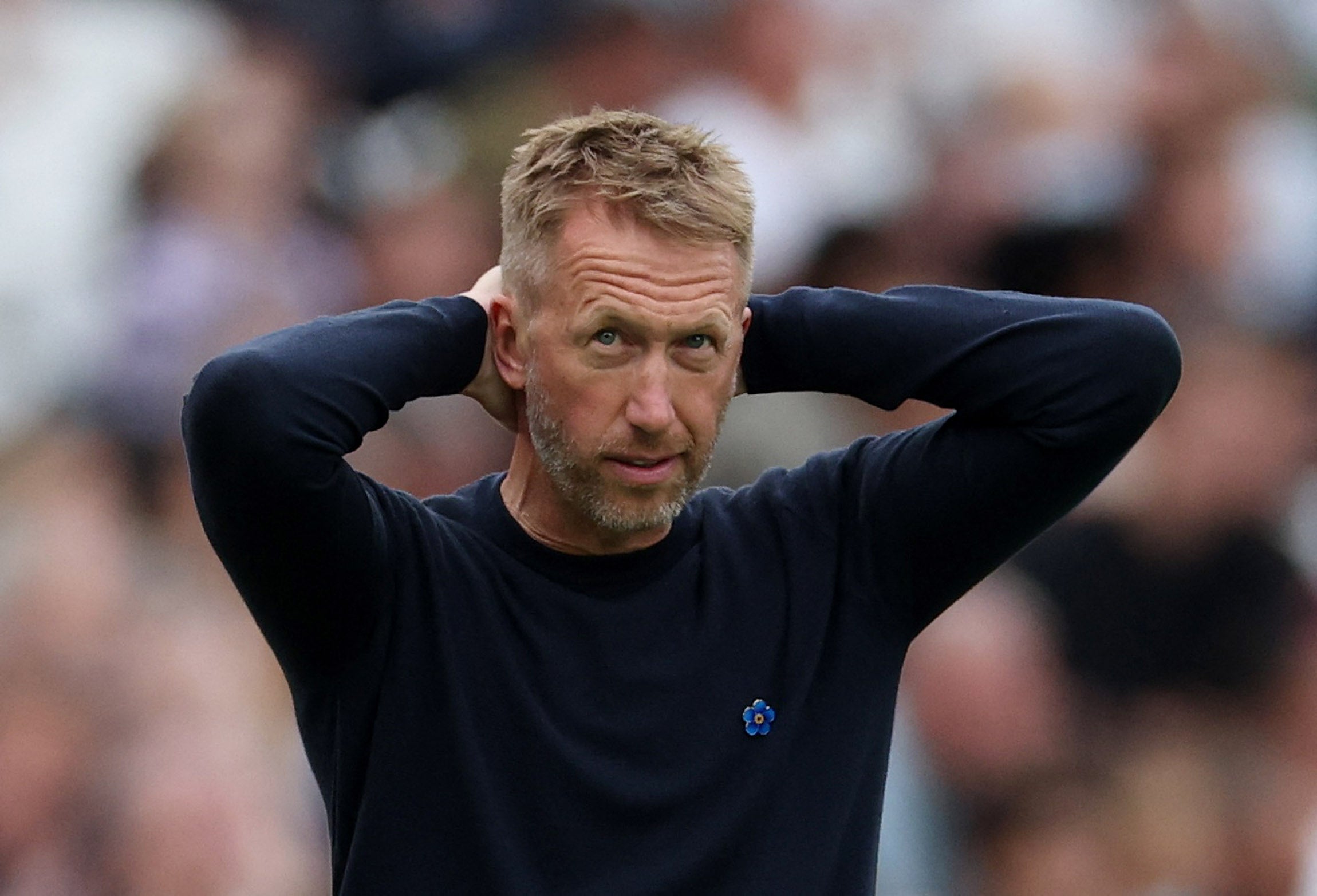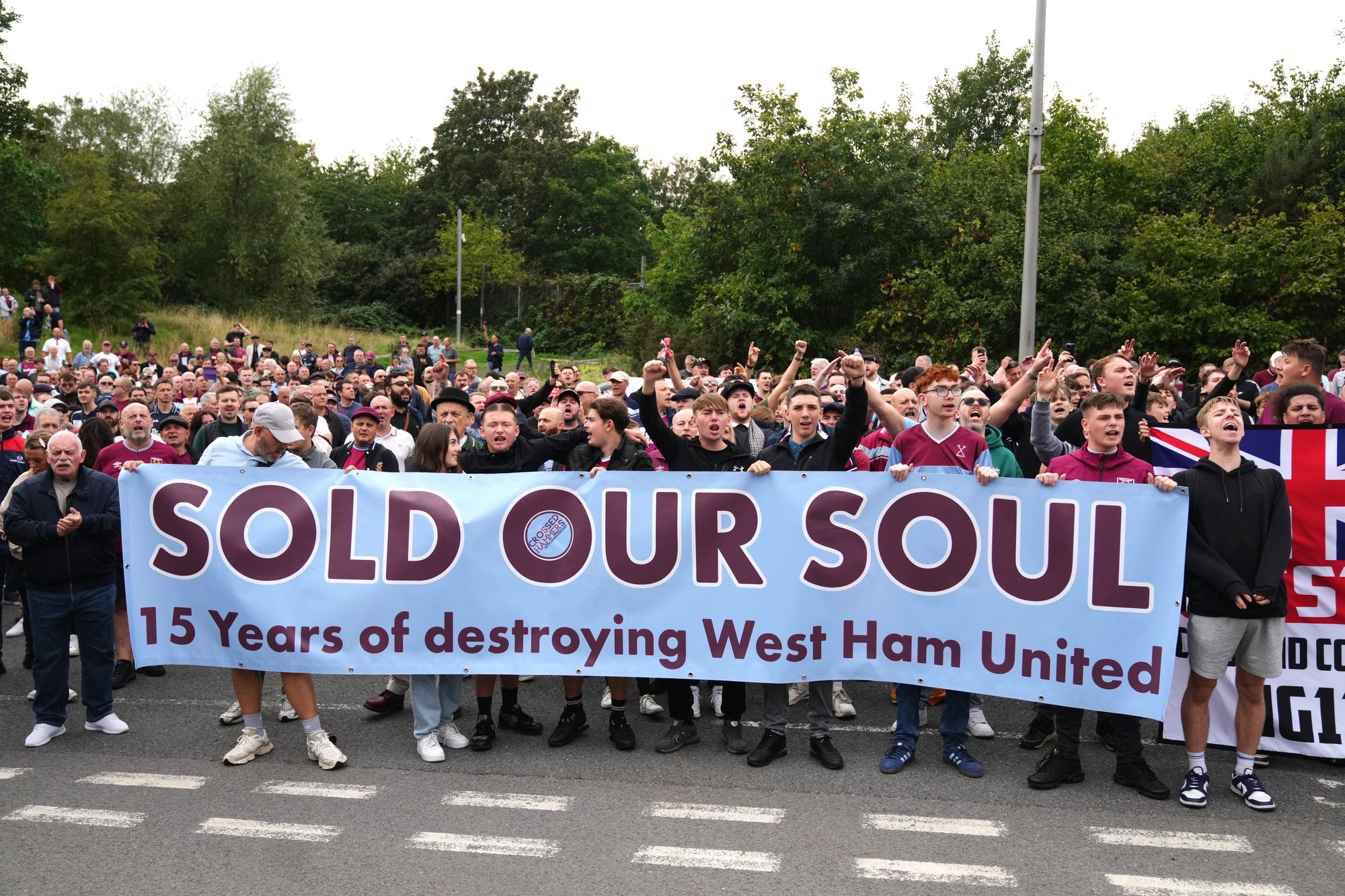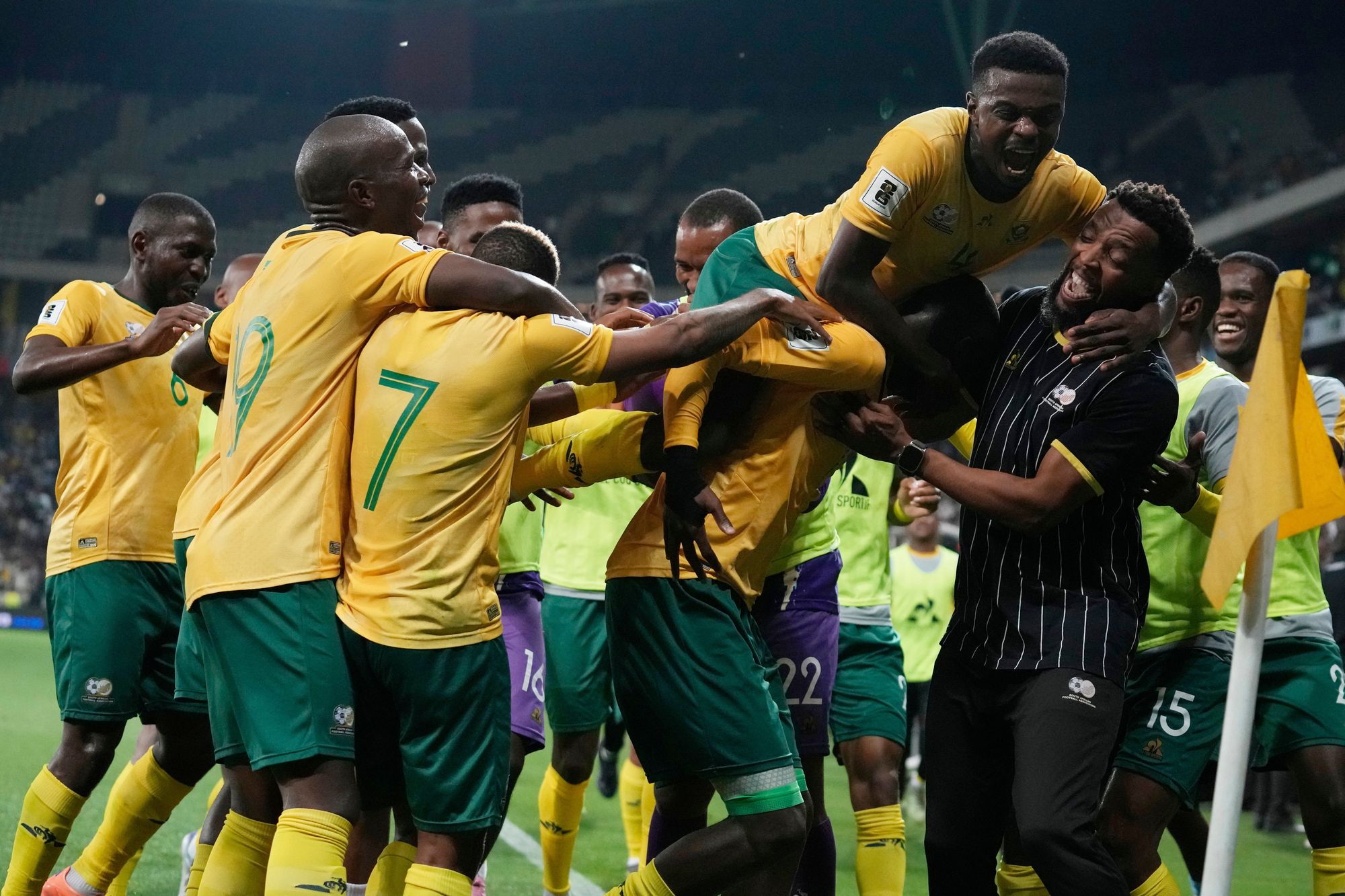

SPORTS
Why Graham Potter’s Struggles Could Highlight West Ham’s Major Flaw – Discover the Shocking Truth!
Published
1 month agoon
By
OBS
So it turns out the West Ham fans were wrong. “Sacked in the morning,” they chanted to Graham Potter during Saturday’s home defeat to Crystal Palace. But he has made it past the weekend. He could limp on into next midweek. Perhaps, in a symbolic move, the final blow will be struck by Everton and David Moyes, the man whose legacy at West Ham has been squandered by his successors and who, of the Hammers’ last five managerial appointments, is the only two to succeed.
For Potter, with the spectre of Nuno Espirito Santo, Slaven Bilic and Gary O’Neil, and with some of the supporters turning on him and nearly all in revolt against the board, it must feel only a matter of time. He has contrived to assemble a worse record with West Ham than Julen Lopetegui, while lasting longer. Perhaps Potter will be condemned by a dead-ball situation. In a league where no one else has let in more than three set-piece goals this season, West Ham have somehow conceded seven. It can be a sign of ineffectualness. It also feels an indication of Potter’s struggles: his previous sides have not been particularly poor at defending corners. West Ham are.
Which feels somehow sadly fitting. West Ham have the worst elements of Potterball, but with added problems that were not previously detected. Their home record is awful, with three straight defeats this season and no wins in eight. West Ham could have considered themselves warned. Ridiculously, Potter’s Brighton won one home league game in the calendar year of 2020; their first in the 2020-21 season came on 31 January, 376 days since the last. An inability to taste victory in front of your own supporters matters more when there are more of them; in West Ham’s case, a difficulty generating an atmosphere at the London Stadium renders it still more significant to have a manager whose teams can rouse the crowd (and not in dissent).

It is a recurring issue that, for all his progressive principles and training-ground excellence as a coach, Potter’s sides do not score enough goals; indeed, it sometimes feels like they do not really have a strategy to score them. At West Ham, Lucas Paqueta, albeit under the cloud of his betting charges, and Mohammed Kudus, before he moved to Tottenham, have rarely played to their best under Potter. Somehow, with all the talent Chelsea had, albeit mitigated by the confusion at Stamford Bridge, his team mustered under a goal a league game there (21 in 22). Over Potter’s Premier League career, his teams averaged just 1.09 games per game; or 41 over a whole campaign. This, presumably, is not what the West Ham way is supposed to be.
And, with each job, it feels harder to escape the sense that getting results is not Potter’s strength. West Ham have 23 points from 23 games under him; only Avram Grant has a lower average in charge of them. Overall, Potter’s points-per-game return in the Premier League (1.19) is worse than those of Stuart Pearce, Ray Wilkins, Tony Pulis and Phil Neal and fractionally better than Alan Ball’s. None of them was afforded the chance to manage Chelsea, which ought to boost the numbers (and not merely the bank balance, courtesy of his five-year contract).
In Potter’s defence, there is a theory that his methods need 12 or 18 months on the training ground to bear fruit. But if Chelsea and West Ham do not come with a guarantee of such time, and if it remains true that he did a stunning job at Ostersund, that ended more than seven years ago. In his days in England and Wales, Potter has arguably only overachieved for 13 months; the last 13 at Brighton, following his first two seasons. He has definitely underachieved at Chelsea and West Ham, even if each was in mitigating circumstances.
The chaos at Chelsea was not entirely Potter’s fault; nor was he responsible for many of the host of signings. At West Ham, he is dealing with the legacy of former director of football Tim Steidten’s terrible recruitment. But at each club, there was a need for a manager who could make sense of the madness. And in part, that required a manager with the personality to carry a crowd with them. Instead, he continued West Ham’s extraordinary habit of appointing uncharismatic managers, Moyes excepted. Manuel Pellegrini, Lopetegui and Potter have a shared blandness.

If the accusation is that Potter plays vanilla football, a willingness to shift formation is not necessarily a disadvantage. Yet this West Ham seem to lack identity as well as direction. As a club, they have gone from European trophy winners to an unhappy mess in two years: again, it is unfair to only blame Potter, but his passivity means he doesn’t feel the answer to anything.
And it is hard to escape the sense that both West Ham and Potter made the wrong choice when they fell into the arms of each other. It can be understandable that a family man wanted a job within commuting distance of Hove but, tellingly, Brighton opted not to reappoint Potter when they went for the more dynamic Fabian Hurzeler instead.
Yet a man who seemed to attract interest from Ajax and Lyon, among others, should have gone abroad. He could have restored a reputation dented by Chelsea; if he failed, it would not be in front of an English audience every week. Such positions may not have come with a Premier League salary but, instead, West Ham has reinforced the sense that he is not suited to the bigger clubs. Brighton, a relative backwater, with a better structure around him, was a better fit. West Ham may have demanded a force of personality he might lack or a capacity to play more captivating football.
When West Ham appointed him, he smiled: “I apologise that everyone is flipping sick of Graham Potter being linked with this job and that job.” It was a recognition he seemed forever touted for positions, including Manchester United and England. If his time at West Ham ends in ignominy, however, the jobs Potter is being linked with may be altogether lower profile.
You may like
-
Naira Plummets for the Third Day in a Row: Shocking New Exchange Rate Hits N1,473.29/$!
-


Shocking Recall: Grocery Store Taco Kits Contain Hot Chocolate Packets!
-
Unbelievable Surge: NGX Market Value Skyrockets to N93.8tn! Discover What’s Driving This Uptrend!
-


Thousands of Civil Servant Passwords Exposed: Experts Warn of Major Security Threat!
-


Young Republicans Caught in Racist Group Chat Resign Following Shocking Revelations
-


Shocking Arrests: Four Charged in Murder of Osun Local Government Chair – What You Need to Know!
SPORTS
South Africa’s Stunning Comeback: First World Cup Qualifying in 16 Years! Can Nigeria Snatch a Last-Minute Playoff Chance?
Published
2 weeks agoon
October 16, 2025By
OBS
South Africa have qualified for their first World Cup since hosting the tournament 16 years ago, although they had Nigeria partially to thank for their progress.
South Africa beat Rwanda 3-0 in Nelspruit to finish first in Group C as Benin, who had a two-point lead going into the final round of fixtures, tumbled from top place to third in the standings after being thumped 4-0 by Nigeria in Uyo.
Victor Osimhen grabbed a hat-trick to keep Nigeria’s hopes alive as they seek to advance to a playoff next month for the four best runners-up from the nine African qualifying groups.
South Africa finished on 18 points, with Nigeria runners-up ahead of Benin on goal difference as both ended with 17 points.

South Africa had three points deducted last month after being found guilty of fielding a suspended player in an earlier qualifier in March, a mistake they admitted.
But that will be largely forgotten now as South Africa qualified for the first time since they hosted the finals in 2010.
Thalente Mbatha scored after five minutes, and Oswin Appollis netted the second in the 21st minute to put South Africa on their way. Striker Evidence Makgopa made it 3-0 in the 72nd minute with a header from a corner.
For Nigeria, Osimhen opened his account in the third minute from Samuel Chukwueze’s through pass and the same player then crossed for the striker to head home a second in the 37th minute.
He completed his hat-trick soon after halftime, heading home a chipped pass from Moses Simon, but the best goal was the last — thrashed in on the volley by Frank Onyeka.
Algeria secured qualification last week and were hoping to celebrate in front of their fans in Tizi Ouzou on Tuesday, but made heavy weather of it and needed two late penalties from Mohammed Amoura to beat Uganda 2-1.
Amoura went top of the scoring charts in the African qualifiers with 10 goals as Algeria finished their Group G campaign with 25 points.
They handed a debut in goal to Luca Zidane, the son of France World Cup winner Zinedine Zidane, but he was beaten after six minutes as Steven Mukwala gave Uganda a shock lead.
Reuters
SPORTS
Heimir Hallgrimsson Aware of World Cup Challenge Ahead After Armenia Victory: What’s Next?
Published
2 weeks agoon
October 15, 2025By
OBS
Heimir Hallgrimsson admits the Republic of Ireland may need to do something special against Portugal next month if they are to make it to next summer’s World Cup finals.
Ireland’s relief at a hard-fought 1-0 Group F victory over 10-man Armenia was tempered by the news of Hungary’s late equaliser which means they will have to at least deny Cristiano Ronaldo and company at the Aviva Stadium next month before targeting victory in Budapest three days later.
Asked if the 2-2 draw in Lisbon had changed anything, Hallgrimsson said: “Not really, it doesn’t change anything. We always knew that we needed to go to Hungary and have a win there.
“This looks like we need a point against Portugal, or Armenia to do us a favour in Yerevan. We all see that this Armenian team is no roll-over. There’s a big heart, there’s aggression and a spirit that is noticeable.”
Evan Ferguson’s 70th-minute header – his fourth goal in five competitive games for his country – ultimately sealed a vital win at the Aviva Stadium which could, and perhaps should, have been more comfortable after Armenia skipper Tigran Barseghyan’s 52nd-minute dismissal for a headbutt on Finn Azaz.
Ireland were largely passive and uninspired during a lukewarm first half but, aided and abetted by Barseghyan’s premature exit, forced their way across the finishing line to fulfil their head coach’s pre-match prophesy.
Hallgrimsson said: “Listen, we said before this camp we would take a scrappy 1-0 win and it probably was kind of a scrappy 1-0 win, so we can’t be unhappy.
“We’ve been complaining about the second game syndrome – we must be happy that we won the second game; we’ve been complaining about conceding early – we didn’t concede early, we didn’t concede at all, so we kept a clean sheet, that’s a good step.
“We’ll take the positives and carry on to the next window. It’s just a new dawn, it’s a new day next window – this result today doesn’t matter at all.
“We just needed the three points to be alive and have a chance, that’s number one, so we cannot be reading too much into that performance today.
“It was always going to be a tough match for us – we needed to win – and again it’s going to be tough, just a different opponent, players playing higher quality next time.”
Armenia boss Yegishe Melikyan admitted Barseghyan’s rush of blood had cost his side dear, but refused to condemn his indiscipline.
Melikyan said: “Of course, the red card changed the game. It was a mistake.
“He took responsibility. He said sorry to the whole dressing room. But, if a player makes a mistake, it is also my mistake and for that I apologise.
“If there was no red card and we played 11 v 11, I think we could have got a good result. I thought we could have won, but we must go forward and I think we can get good results in the near future.”
SPORTS
Wales Sensation Jess Fishlock Shocks Fans with Surprise International Retirement: What This Means for the Future!
Published
2 weeks agoon
October 15, 2025By
OBS
Wales’ record goalscorer Jess Fishlock has announced her retirement from international football after next week’s friendly against Australia.
The 38-year-old Seattle Reign midfielder, who has scored 48 goals for her country, will play her 166th and final international match against the Matildas at Cardiff City Stadium on 25 October.
Fishlock said: “After 19 years and the most incredible journey of proudly representing my country, I have made the decision that the match against Australia will be my last one in the red of Cymru.
“From kicking my first ball with my brothers in Llanrumney, football has been in my blood.
“When I had my debut against Switzerland in Kloten in 2006, never did I imagine I would have the honour of representing my Cymru more than 150 times. Every minute was a pleasure, a privilege, and an honour.”
Having made her senior international debut against Switzerland in 2006, Fishlock became the first male or female footballer to make 100 appearances for Wales, against Northern Ireland in 2017 and marked her milestone by scoring in a 3-1 win.
She became her country’s leading international scorer in July 2024, notching her 45th goal in a 2-0 European Championship qualifying win against Kosovo.
After helping Wales qualify for their first major women’s tournament at the 2025 European Championship, Fishlock became the oldest-ever scorer in the women’s competition against France, aged 38 years and 176 days.
“The Euros was the pinnacle of my football career, seeing the dragon on the world stage for the first time will be a memory that will stay with me for a lifetime,” she said.
“To all the players and staff, past and present, diolch (thanks). It has been an incredible journey. The team has always felt like a family and after all the good and bad times, we finally achieved what we always dreamed of.”
Fishlock, who began her career at hometown club Cardiff and has had spells at Glasgow City, Melbourne Victory, Frankfurt and Lyon among others, also thanked her wife, former Seattle team-mate Tziarra King, friends and family for their support.
She added: “I love you all. Without the support you have all shown, without you getting me through the difficult moments, I never would have achieved what I achieved.
“To my Mum, a woman whose love and guidance allowed me to chase and reach my dreams. You believed in me before I believed in myself.
“To my wife Tziarra, for learning about our beautiful country and always supporting me and us. Thank you.”
PA
Categories
Top Tags
Related posts






















